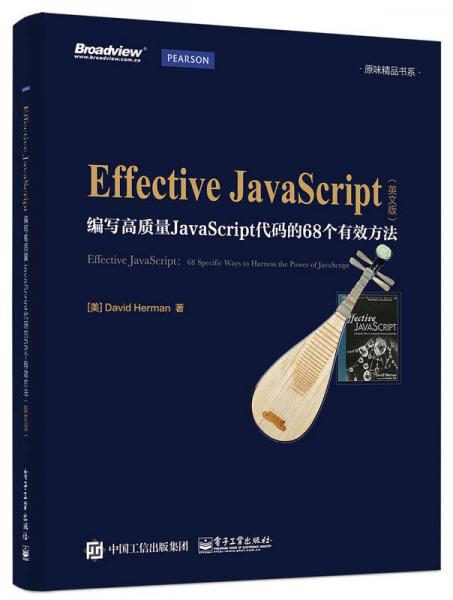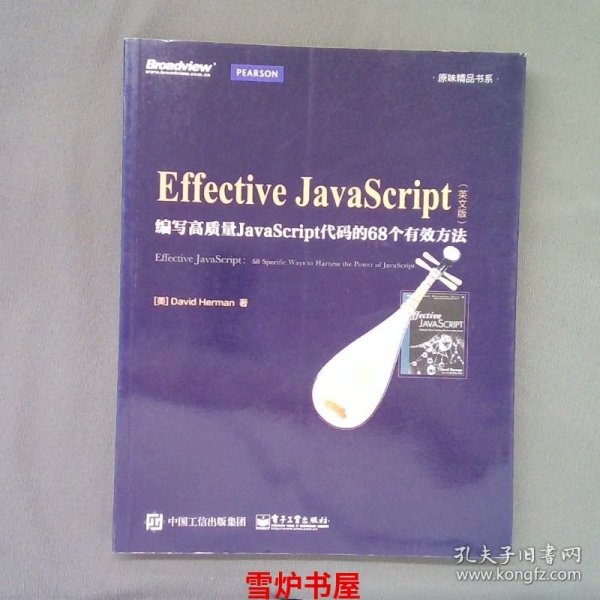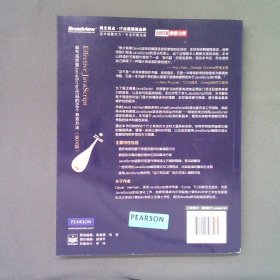雪炉书屋

- 商品详情
- 店铺评价
-
图书条目信息

Effective Javascript:编写高质量JavaScript代码的68个有效方法(英文版)
- 作者: [美] David Herman (大卫·赫尔曼) 著
- 出版社: 电子工业出版社
- 出版时间: 2016-03
- 版次: 1
- ISBN: 9787121273032
- 定价: 65.00
- 装帧: 平装
- 开本: 16开
- 纸张: 胶版纸
- 页数: 224页
- 字数: 270千字
- 正文语种: 英语
- 原版书名: 大卫·赫尔曼 (David Herman)
- 丛书: 原味精品书系
展开全部
- 货号:
- JZH20231107007
- 商品描述:
-
推荐序
前言
致谢
关于作者
Chapter 1: Accustoming Yourself to JavaScript
Item 1: Know Which JavaScript You Are Using
Item 2: Understand JavaScript’s Floating-Point Numbers
Item 3: Beware of Implicit Coercions
Item 4: Prefer Primitives to Object Wrappers
Item 5: Avoid using == with Mixed Types
Item 6: Learn the Limits of Semicolon Insertion
Item 7: Think of Strings As Sequences of 16-Bit Code Units
Chapter 2: Variable Scope
Item 8: Minimize Use of the Global Object
Item 9: Always Declare Local Variables
Item 10: Avoid with
Item 11: Get Comfortable with Closures
Item 12: Understand Variable Hoisting
Item 13: Use Immediately Invoked Function Expressions to Create Local Scopes
Item 14: Beware of Unportable Scoping of Named Function Expressions
Item 15: Beware of Unportable Scoping of Block-Local Function Declarations
Item 16: Avoid Creating Local Variables with eval
Item 17: Prefer Indirect eval to Direct eval
Chapter 3: Working with Functions
Item 18: Understand the Difference between Function, Method, and Constructor Calls
Item 19: Get Comfortable Using Higher-Order Functions
Item 20: Use call to Call Methods with a Custom Receiver
Item 21: Use apply to Call Functions with Different Numbers of Arguments
Item 22: Use arguments to Create Variadic Functions
Item 23: Never Modify the arguments Object
Item 24: Use a Variable to Save a Reference to arguments
Item 25: Use bind to Extract Methods with a Fixed Receiver
Item 26: Use bind to Curry Functions
Item 27: Prefer Closures to Strings for Encapsulating Code
Item 28: Avoid Relying on the toString Method of Functions
Item 29: Avoid Nonstandard Stack Inspection Properties
Chapter 4: Objects and Prototypes
Item 30: Understand the Difference between prototype, getPrototypeOf, and__proto__
Item 31: Prefer Object.getPrototypeOf to __proto__
Item 32: Never Modify __proto__
Item 33: Make Your Constructors new-Agnostic
Item 34: Store Methods on Prototypes
Item 35: Use Closures to Store Private Data
Item 36: Store Instance State Only on Instance Objects
Item 37: Recognize the Implicit Binding of this
Item 38: Call Superclass Constructors from Subclass Constructors
Item 39: Never Reuse Superclass Property Names
Item 40: Avoid Inheriting from Standard Classes
Item 41: Treat Prototypes As an Implementation Detail
Item 42: Avoid Reckless Monkey-Patching
Chapter 5: Arrays and Dictionaries
Item 43: Build Lightweight Dictionaries from Direct Instances of Object
Item 44: Use null Prototypes to Prevent Prototype Pollution
Item 45: Use hasOwnProperty to Protect Against Prototype Pollution
Item 46: Prefer Arrays to Dictionaries for Ordered Collections
Item 47: Never Add Enumerable Properties to Object.prototype
Item 48: Avoid Modifying an Object during Enumeration
Item 49: Prefer for Loops to for...in Loops for Array Iteration
Item 50: Prefer Iteration Methods to Loops
Item 51: Reuse Generic Array Methods on Array-Like Objects
Item 52: Prefer Array Literals to the Array Constructor
Chapter 6: Library and API Design
Item 53: Maintain Consistent Conventions
Item 54: Treat undefined As “No Value”
Item 55: Accept Options Objects for Keyword Arguments
Item 56: Avoid Unnecessary State
Item 57: Use Structural Typing for Flexible Interfaces
Item 58: Distinguish between Array and Array-Like
Item 59: Avoid Excessive Coercion
Item 60: Support Method Chaining
Chapter 7: Concurrency
Item 61: Don’t Block the Event Queue on I/O
Item 62: Use Nested or Named Callbacks for Asynchronous Sequencing
Item 63: Be Aware of Dropped Errors
Item 64: Use Recursion for Asynchronous Loops
Item 65: Don’t Block the Event Queue on Computation
Item 66: Use a Counter to Perform Concurrent Operations
Item 67: Never Call Asynchronous Callbacks Synchronously
Item 68: Use Promises for Cleaner Asynchronous Logic
Index
本书由资深 JavaScript 技术专家 David Herman 所著。书中基于 JavaScript 标准的新版本前所未有地阐明了 JavaScript 语言的内部运作机制――帮助你充分利用 JavaScript 语言的表现力。通过全书归纳的 68 个行之有效的方法和大量具体实例,作者详细讲解了如何更有效地运用这门灵活且富有表现力的语言,以及如何规避其缺陷。你将学到如何选择正确的编程风格,管理一些超出意料的问题,以及成功使用 JavaScript 编程完成从数据结构到并发的方方面面。
无论你写了多久的 JavaScript 代码,本书都将有助于增进你对这门强大的编程语言的理解,助你编写更可预测、更可靠且具维护性的程序。
配送说明
...
相似商品
为你推荐

 占位居中
占位居中











 直播中,去观看
直播中,去观看